- Home
- Michael Crichton
Scratch One Page 6
Scratch One Read online
Page 6
“Exactement. Shall we meet?”
“All right. Who is this I am talking to?”
“Your room, tomorrow at noon. Okay?”
“Of course.”
Another click. The reels spun silently. Liseau reached forward and shut off the machine. Then he lit a cigarette, a Sobranie Black Russian, dark with a gold tip. He drew on the rich tobacco for a moment, and stared moodily at the tape.
“I don’t like it,” he said at last.
“I thought you should hear.”
“You know the other voice?”
Brauer shook his head.
“Neither do I.” Liseau pursed his lips. This conversation spoke badly for Mr. Carr. But if his worst suspicions were correct, it also spoke badly for his own group.
“What is the other conversation?”
“The voice has been identified as the embassy man.”
Liseau turned the recorder on, and heard Carr’s second conversation. When he was through, he was more confused than he was at the start.
“Has he gone to the consulate?”
“No.”
“Has he met anybody?”
“Not yet.”
Liseau stubbed out his cigarette in quick stabs. “It just doesn’t make sense,” he said, thinking aloud. Nobody talked to his boss that way—unless Carr had nothing to do with the consulate, and was genuinely confused. He certainly sounded that way.
“What happened last night, when you followed him?”
“He got away.”
“I see.” That was ah interesting development. “And what about the girl, our darling Suzanne?”
Brauer looked uncomfortable. “She has disappeared.”
“Disappeared?”
“Apparently. She was waiting for him in the room, and she tried to extract information from him. We have part of the conversation on tape. But then something happened—the water was turned on, and we could not hear. It is an old trick, masking with water. And she has not reported back yet.”
“All right,” Liseau said. His face was grim, his chin set. “Leave me now. I want to hear the rest of the tape, and make some calls.”
Brauer nodded, and got out of his chair in a single, smooth motion. He moved well for a big man; his grace was swift, controlled, and his strength was deadly. Liseau watched him in satisfaction.
He clicked on the recorder and listened once more.
A door slammed.
A voice said, “Une heure moins cinq.”
There was silence. Then Carr’s slurred voice saying “Comfortable?” and Suzanne’s answering giggle.
Liseau frowned as he listened.
Ralph Gorman sat outside the door and listened to the slapping sounds, and a female voice crying. He sweated as he listened. If there was anything he disliked, it was interrogating a woman. It ran against everything in his nature. Besides, it was perfectly obvious that this girl wouldn’t talk. She might be the hottest thing going in bed, but she had nothing to say. Somebody had frightened the wits out of her.
Gorman puffed on his pipe. The sobbing continued. It was unbearable: he took out a pad and began doodling. Thank God he was seeing his psychiatrist that afternoon.
Agents, he thought, gloomily. Idiots, all of them. Think they can handle anything. Egotists. Why the hell hadn’t Morgan called in? Who did he think he was, anyhow?
Liseau looked steadily at Brauer. “I think it is best,” he said, “to arrange a personal interview with Mr. Carr.”
The German nodded stiffly.
“As soon as possible. Do it neatly; I don’t want little pieces or wagging tongues left around. Is that clear?”
“Clear.” The German turned to go.
“Ernst.”
The blond man stopped, his hand on the doorknob.
“Don’t kill him.”
“I won’t.”
“Ernst.”
There was a pause.
“I will be very unhappy if he is dead. If he is dead, don’t bring him back. And don’t you come back.”
Almost imperceptibly, Ernst Brauer nodded, then left, shutting the door softly behind him.
Liseau reached for another Sobranie cigarette, and contemplated the smooth surface of his desk. Perhaps it was unwise to trust Brauer with such a job. The man’s every instinct was to kill—he did it as casually as another person might flick an ash.
Liseau hoped he wouldn’t foul things up.
The girl stood up on the beach, yawned, and stretched her arms. Absently, she scratched her smooth dark stomach. Then, jiggling softly in her bikini, she went down to the water and gingerly stepped in. She sucked in her breath as the first roller washed across her knees; she could suck in her breath with great effect.
Roger Carr, standing above on the Promenade des Anglais, grinned as he watched her. She was bending over now, and her curved back glistened with suntan oil as she splashed water up on her body. She walked farther out until she was thigh-deep in the water, and shivered briefly, wiggling her bottom. She knew exactly what she was doing.
Still grinning, he turned away and continued strolling down the sidewalk. It was a beautiful day, clear and warm, and the drowsy afternoon silence was unbroken except for the laughter of people on the beach. Carr walked along and smoked a cigarette, noticing the other people on the promenade—the retired British dowagers, dressed in heavy shawls despite the heat, the navy sailors, strutting in groups of three and four, gawking at the girls, the young mothers, pouting and elaborately coifed, walking with their children.
He went down to the Quai des Etats-Unis, cut through the formal green lawns of the Jardin Albert I, and entered the crooked alleys of Old Nice. It was refreshingly cool in the old city; the yellow slanting buildings rose so high above the narrow streets that the sunlight did not reach the pavement. Carr passed along a street of fish shops, shuttered for the afternoon siesta, and deserted except for a pair of scruffy cats contesting a discarded scrap of fish tail. Their yowling and hissing died away as he approached, then resumed behind his back. He continued on, and came abruptly into a large square.
In the center of the square, shaded from the sun by a concrete canopy, was the flower market. Early afternoon was the busiest time for the market, and it was packed with buyers, wandering among the stalls and carts, haggling, arguing, gossiping. Carr joined the crowd, looking at the brightly colored blossoms wrapped in tissue-paper cones—scarlet and mauve carnations, orange chrysanthemums, white lilies and yellow daisies, blue hyacinths. The smells mingled to produce a sort of clean freshness. He finally settled on a dozen red roses, paid the toothless, taciturn old woman, and walked slowly back toward the water, whistling to himself.
He passed along a quiet street lined with produce and meat shops, and he stopped for a moment before the boxes of fresh strawberries, cherries, and oranges set out in the sun. It was at that moment that he noticed the man.
The man was walking down the street toward him, one hand in his pocket, an unlighted cigarette dangling from his lip. He approached Carr, and looked at him hesitantly. He was wearing a gray and black glen-plaid suit, cut in the current French fashion, with narrow trousers and a short double-vented jacket. His shoes were brightly polished. Above a florid face, his hair was thinning; he looked like any normal, middle-aged, prosperous businessman.
Still hesitant, almost doubtful, the man drew near and took the cigarette out of his mouth. “Pardon, monsieur. Avez-vous de feu?” He gestured, in an embarrassed way, with the cigarette.
“Huh? Sure.” Carr laughed. “Mais oui.” He shifted the flowers, tucking them under his left elbow, and fumbled in his pocket for his lighter.
The gun glinted in the sun. Carr saw it, and reacted instinctively, dropping his roses and catching the man’s wrist. The gun swung high in the air, and the two men grappled silently for a moment, face to face. Then Carr began to shout for help.
Out of the corner of his eye, he saw the blue and white uniform of a policeman, directing traffic around the flower market. Th
e policeman looked over, and moments later Carr heard a shrill whistle and running feet. The other man must have seen it, too; he dropped the gun, which clanked heavily on the pavement, and tried to run. Carr held on. He heard the man’s suit rip.
Suddenly, a black Citroën came around the corner, moving very fast. Carr heard the rapid tatting of a machine gun and, releasing his attacker, threw himself to the ground. Above his head, windows shattered, and splinters of glass tinkled down around him. The car roared by, leaving a cloud of acrid blue smoke hanging in the air. Carr got up, dazed.
He leaned shakily against the wall, and looked down at the other man. The man lay beside the cigarette and the fallen flowers. Across his back, like a line of hot rivets, were three neat holes. The blood was already seeping into the sidewalk. Carr became aware that people were shouting, and a large crowd gathering around him.
The policeman arrived and took Carr away.
Chapter VII
THE WAITING ROOM OF THE police station was long and gray, and very quiet. It had the immediately recognizable atmosphere of all institutional waiting rooms—the remnants of a halfhearted attempt, long since abandoned, to make things pleasant for people who were forced to sit and do nothing while they contemplated some future disagreeable event. This room was furnished with dusty leather chairs that slowly leaked white stuffing onto the wooden floor. A scarred coffee table displayed old magazines, copies of L’Express and Paris Match dating from the Algerian war, and one incongruous issue of Elle. On top of the magazines, like a battered crown, rested a triangular Cinzano ashtray. It had been broken once, and glued together.
Besides Carr, there were only two other men in the room, both policemen. One, a clerk, worked at a corner table, typing sporadically and occasionally making brief phone calls in a low voice. The sergeant, whose job it was to watch Carr, sat slumped in one of the leather chairs, patiently cleaning his fingers with a toothpick.
Carr waited, smoking one cigarette after another. His mind seemed incapable of organized thought. After a while, he ran out of cigarettes, and asked the sergeant if he could go buy some more. The sergeant said he couldn’t. Carr began to make a scene, and the officer, with a disgusted look, finally sent someone out for them. They came—Disque Bleus—and Carr drew the rough smoke into his lungs with a sense of relief. He realized, then, that he was more nervous than he had thought—that for the first time in his life, he was really scared.
He looked often at his watch, only to discover each time that it had been smashed when he fell. The hands beneath the shattered crystal remained frozen at 2:46. There was no clock in the waiting room, and it irritated Carr. He kept asking the sergeant what time it was, partly to find out, and partly to express his annoyance. After an hour, the sergeant snapped that it didn’t matter what time it was. Carr said nothing after that.
Finally, another officer came into the room, and the sergeant pulled himself into a semblance of attention. The new man walked briskly up to Carr.
“Suivez-moi, s’il vous plait.”
Carr shrugged, got up, and followed him through dirty swinging doors, out of the waiting room. They went down a long gray corridor, turned left, and continued down another. The air here was stale, and the bare bulbs overhead cast a harshly utilitarian light.
The officer stopped at one door and opened it without knocking. Carr noticed that there was no nameplate on the door as he stepped inside.
The office he entered was the same institutional gray as the rest of the building, but the room was carefully dusted. Through a large window on the left, he could see the bright afternoon sunlight falling over plane trees. Heavy green filing cabinets, padlocked, lined the wall to the right.
The room was dominated by an oversized oak desk, crowded with forms, two telephones, and an aging typewriter. A large desk lamp threw a blue-white light over the clutter of papers, and cast deep shadows under the eyes of the man who looked up.
“Asseyez-vous, monsieur.” The man did not stand, or show any particular interest in Carr. He regarded him in a detached way, as if he were a prospective buyer for a product of dubious usefulness.
Carr sat down.
“My name is Captain Vascard,” the policeman said. “It is my job to investigate accidents of the kind your sort are involved in.” He sounded disgusted.
While he spoke, the other officer went to the window and drew the shades, then left the room. The office was entirely dark, except for the desk lamp.
There was a silence.
“To whom,” said Vascard, “are you responsible while you are in this country?”
“I don’t know what you mean.”
“Of course you do. But if you prefer to play it straight, I have time.” Another silence. “Tell me, do you think we like it when you people come in and start murdering nationals right and left? Do we do that sort of thing when we’re in the United States?”
Carr shrugged helplessly. What was this man talking about, anyway?
“Very inconsiderate of you,” Vascard said. “Particularly since there are now so many forms to fill out.” His beefy hand reached into the light and pushed at some of the papers. “It is a waste of my time.”
Another long, rather tense silence.
“You look nervous, Mr. … Carr.”
“I’m not nervous,” Carr said.
Vascard smiled. He had a pleasant smile, which spread across his wide, rugged face like a spring bubbling over. “A consummate actor, without question.” He got up and walked around the desk—a big man, broad-shouldered and deep-chested, but light on his feet. He seemed entirely relaxed except for his eyes, which moved constantly, always alert.
“Cigarette? French, I’m afraid, but you may find they are an acquired taste.” He smiled again innocently. “You will not reconsider, and be more helpful?”
“I will be as helpful as I can.”
Vascard sighed, and resumed his place behind the desk. He leaned back in his chair, almost completely hidden behind the bright glare of the lamp. “I have been reading your report of the incident. Is there anything you wish to add to your statement?”
“No. It was quite complete.”
“Complete as only a lawyer could make it, Mr. Carr. That is what amazes me.” He paused, as if something had occurred to him. Then he said, “You were attacked on the street in midafternoon by a man you did not know. You struggled with him, called for help. The man was then shot from a passing car. That seems to be the essence of it, am I right?”
“Yes,” Carr said warily.
“A very strange business indeed. What do you make of it?” The voice came out, disembodied, from behind the bright pool of light.
“I don’t know. I suppose he was going to rob me.”
“I see.” Vascard paused. “How long have you been in Nice, Mr. Carr?”
“I arrived yesterday.”
“And how long do you intend to stay?”
“I’m not sure. Until my business is finished.”
“Your business here is”—fingers reached into the light for Carr’s statement—“to purchase a villa for a client?”
“That’s right.”
“Who is the client?”
“You know I can’t tell you that.”
“Mr. Carr, a man has been murdered, and you have been … involved.”
“My client’s name is immaterial.”
“Perhaps. But that is my decision.”
“I’m sorry. I can’t tell you my client’s name.”
“I see.” The voice was unperturbed. Carr watched the smoke from Vascard’s cigarette snaking across the desk into the light “They have shown you the body of the dead man?”
“Yes.”
“And you do not recognize him?”
“No.”
“You have no idea who he might be?”
“None.”
Vascard’s voice was soft, drifting across the room with the cigarette smoke. “Mr. Carr, are you quite sure?”
“Yes. Of course I am.
”
Another pause. “About the Citroën—had you ever seen it before?”
“No, I don’t think so. But there are a lot of black Citroëns in France.”
“Did you happen to notice the license number?”
“No.”
“The color of the license plate?”
“No,” Carr said. “Does it matter?”
“It might. Rented cars have different-color plates.”
“Oh.”
“When the car went by, did you see anyone inside clearly?” Carr was annoyed. “They were shooting at me, remember?”
“At you, Mr. Carr?”
He hesitated. “Of course. Who else would they be shooting at?”
“The other man.”
“That’s very strange,” Carr said slowly.
“This is all very strange. Try to see the situation from our viewpoint. An American arrives in Nice, on business he will not explain, and—”
“I have explained. I’m buying a villa.”
“Buying a villa.” For the first time, irritation crept into Vascard’s voice. “That’s the crudest cover I’ve ever heard.” A puff of smoke, blown in exasperation, slid into the light. “Now then. You arrive here, and the next day a man pulls a gun on you. You fight him. We do not know what he intended, and now we will never know.”
“I told you, I assumed he was robbing me.”
“Very well. That seems logical, doesn’t it? Tell me, do you attend horseraces?”
Carr frowned, puzzled by this new line of questioning. “No, not usually.”
“Spend much time in casinos?”
“No. I’m not the gambling type.”
“And yet, as a man untrained in this sort of thing, you took a great gamble in fighting with an armed robber. How do you explain it?”
“It was instinctive.”
“Was there anything about his manner, his dress, or his actions which alerted you beforehand?”
“No, not really.”
“Frankly, I would never have thought him a robber. He was very well dressed.”
“For all I know, he was a very successful robber. This must be a good part of the world for robbers.”
Vascard sighed. “His gun was not loaded.”

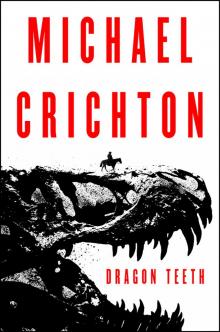 Dragon Teeth
Dragon Teeth Jurassic Park
Jurassic Park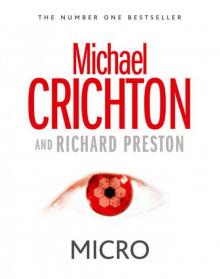 Micro
Micro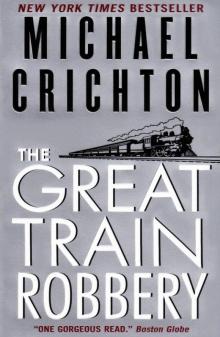 The Great Train Robbery
The Great Train Robbery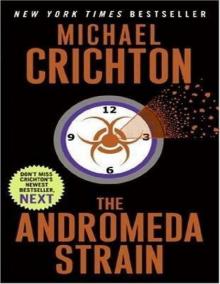 The Andromeda Strain
The Andromeda Strain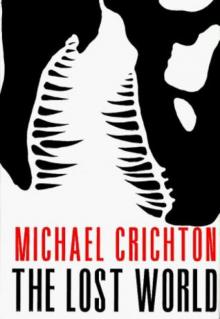 The Lost World
The Lost World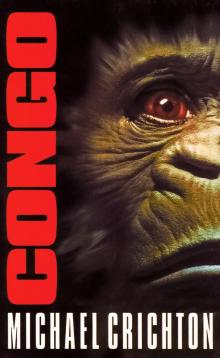 Congo
Congo Travels
Travels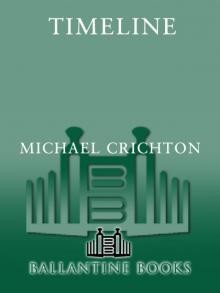 Timeline
Timeline Sphere
Sphere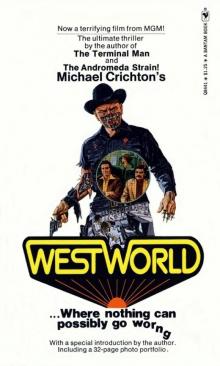 Westworld
Westworld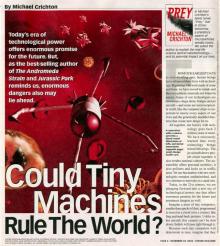 Prey
Prey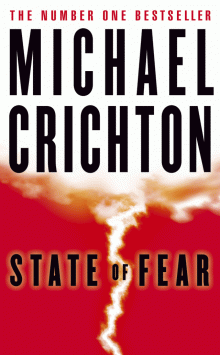 State Of Fear
State Of Fear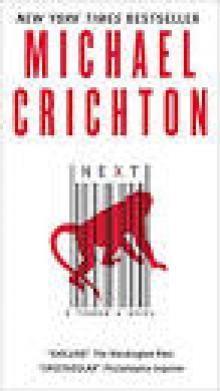 Next
Next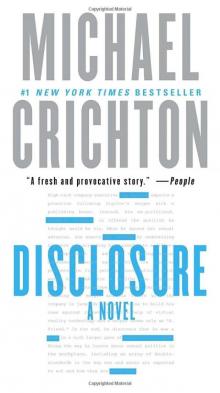 Disclosure
Disclosure Pirate Latitudes
Pirate Latitudes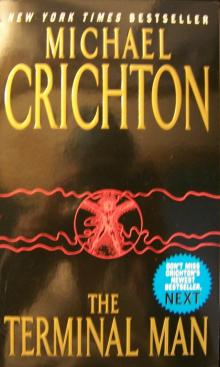 The Terminal Man
The Terminal Man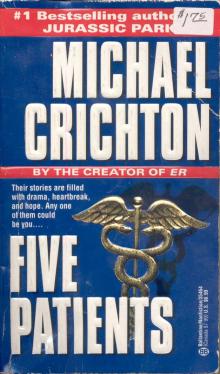 Five Patients
Five Patients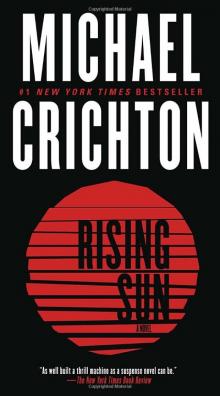 Rising Sun
Rising Sun Binary
Binary The Andromeda Evolution
The Andromeda Evolution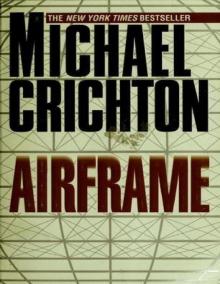 Airframe
Airframe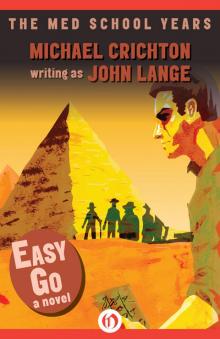 Easy Go
Easy Go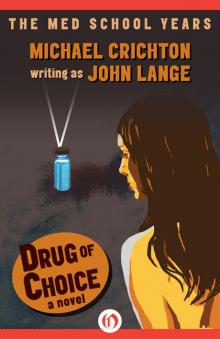 Drug of Choice
Drug of Choice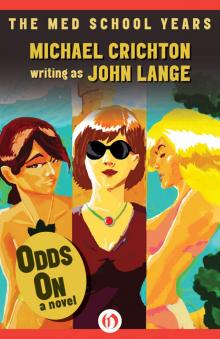 Odds On: A Novel
Odds On: A Novel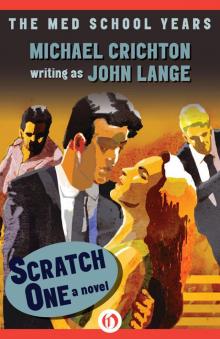 Scratch One
Scratch One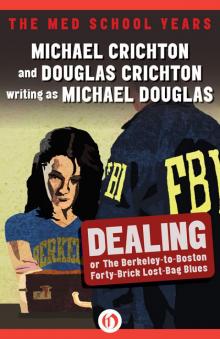 Dealing or The Berkeley-to-Boston Forty-Brick Lost-Bag Blues
Dealing or The Berkeley-to-Boston Forty-Brick Lost-Bag Blues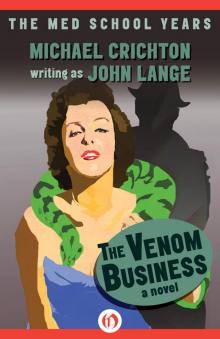 Venom Business
Venom Business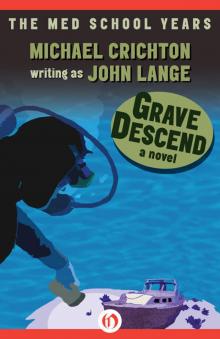 Grave Descend
Grave Descend Gold - Pirate Latitudes
Gold - Pirate Latitudes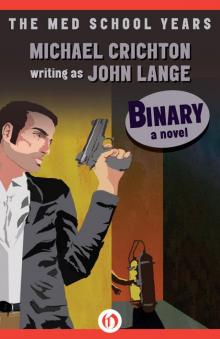 Binary: A Novel
Binary: A Novel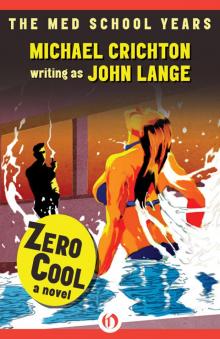 Zero Cool
Zero Cool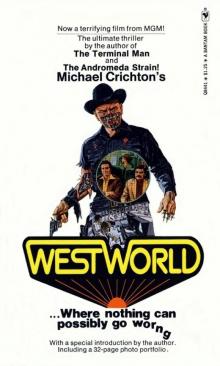 Delos 1 - Westworld
Delos 1 - Westworld